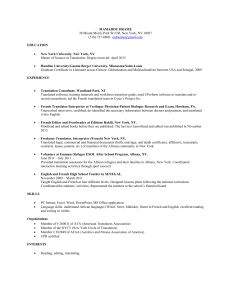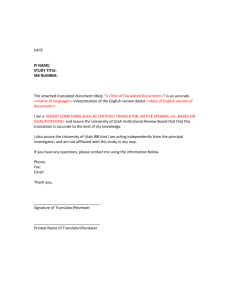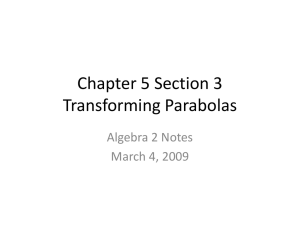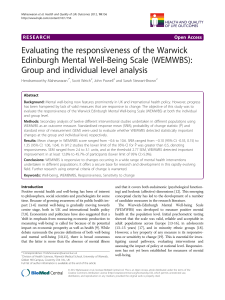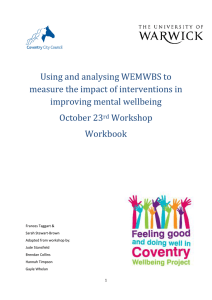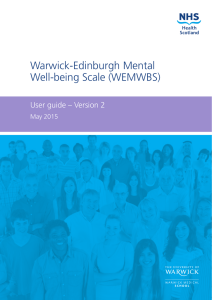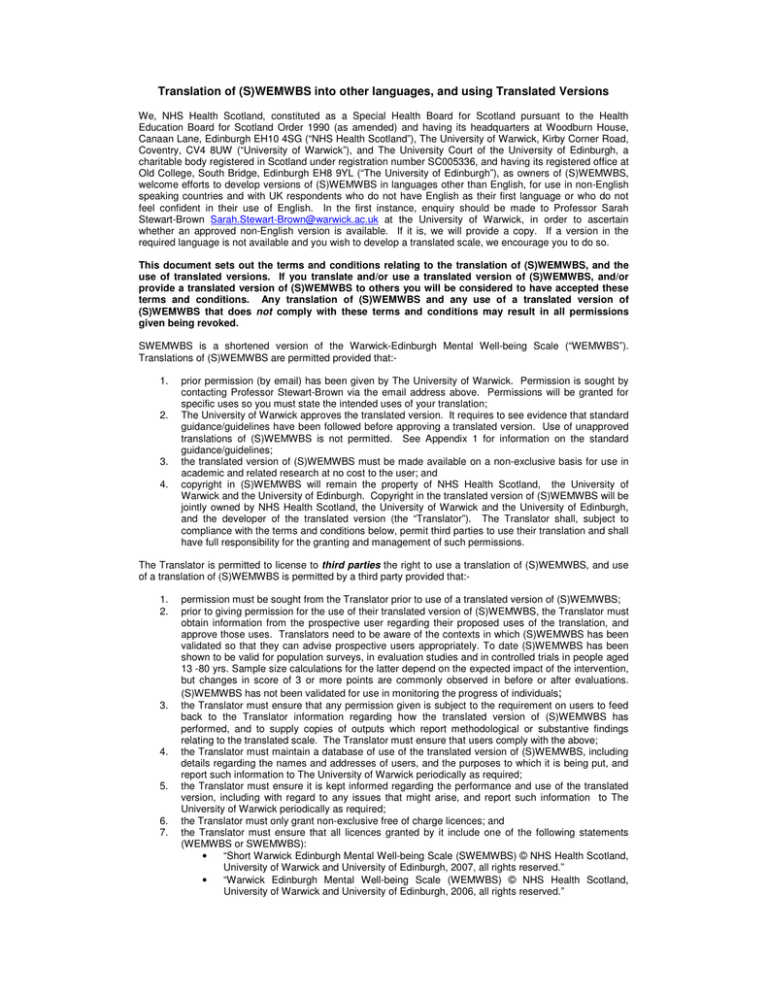
Translation of (S)WEMWBS into other languages, and using Translated Versions
We, NHS Health Scotland, constituted as a Special Health Board for Scotland pursuant to the Health
Education Board for Scotland Order 1990 (as amended) and having its headquarters at Woodburn House,
Canaan Lane, Edinburgh EH10 4SG (“NHS Health Scotland”), The University of Warwick, Kirby Corner Road,
Coventry, CV4 8UW (“University of Warwick”), and The University Court of the University of Edinburgh, a
charitable body registered in Scotland under registration number SC005336, and having its registered office at
Old College, South Bridge, Edinburgh EH8 9YL (“The University of Edinburgh”), as owners of (S)WEMWBS,
welcome efforts to develop versions of (S)WEMWBS in languages other than English, for use in non-English
speaking countries and with UK respondents who do not have English as their first language or who do not
feel confident in their use of English. In the first instance, enquiry should be made to Professor Sarah
Stewart-Brown Sarah.Stewart-Brown@warwick.ac.uk at the University of Warwick, in order to ascertain
whether an approved non-English version is available. If it is, we will provide a copy. If a version in the
required language is not available and you wish to develop a translated scale, we encourage you to do so.
This document sets out the terms and conditions relating to the translation of (S)WEMWBS, and the
use of translated versions. If you translate and/or use a translated version of (S)WEMWBS, and/or
provide a translated version of (S)WEMWBS to others you will be considered to have accepted these
terms and conditions. Any translation of (S)WEMWBS and any use of a translated version of
(S)WEMWBS that does not comply with these terms and conditions may result in all permissions
given being revoked.
SWEMWBS is a shortened version of the Warwick-Edinburgh Mental Well-being Scale (“WEMWBS”).
Translations of (S)WEMWBS are permitted provided that:1.
2.
3.
4.
prior permission (by email) has been given by The University of Warwick. Permission is sought by
contacting Professor Stewart-Brown via the email address above. Permissions will be granted for
specific uses so you must state the intended uses of your translation;
The University of Warwick approves the translated version. It requires to see evidence that standard
guidance/guidelines have been followed before approving a translated version. Use of unapproved
translations of (S)WEMWBS is not permitted. See Appendix 1 for information on the standard
guidance/guidelines;
the translated version of (S)WEMWBS must be made available on a non-exclusive basis for use in
academic and related research at no cost to the user; and
copyright in (S)WEMWBS will remain the property of NHS Health Scotland, the University of
Warwick and the University of Edinburgh. Copyright in the translated version of (S)WEMWBS will be
jointly owned by NHS Health Scotland, the University of Warwick and the University of Edinburgh,
and the developer of the translated version (the “Translator”). The Translator shall, subject to
compliance with the terms and conditions below, permit third parties to use their translation and shall
have full responsibility for the granting and management of such permissions.
The Translator is permitted to license to third parties the right to use a translation of (S)WEMWBS, and use
of a translation of (S)WEMWBS is permitted by a third party provided that:1.
2.
3.
4.
5.
6.
7.
permission must be sought from the Translator prior to use of a translated version of (S)WEMWBS;
prior to giving permission for the use of their translated version of (S)WEMWBS, the Translator must
obtain information from the prospective user regarding their proposed uses of the translation, and
approve those uses. Translators need to be aware of the contexts in which (S)WEMWBS has been
validated so that they can advise prospective users appropriately. To date (S)WEMWBS has been
shown to be valid for population surveys, in evaluation studies and in controlled trials in people aged
13 -80 yrs. Sample size calculations for the latter depend on the expected impact of the intervention,
but changes in score of 3 or more points are commonly observed in before or after evaluations.
(S)WEMWBS has not been validated for use in monitoring the progress of individuals;
the Translator must ensure that any permission given is subject to the requirement on users to feed
back to the Translator information regarding how the translated version of (S)WEMWBS has
performed, and to supply copies of outputs which report methodological or substantive findings
relating to the translated scale. The Translator must ensure that users comply with the above;
the Translator must maintain a database of use of the translated version of (S)WEMWBS, including
details regarding the names and addresses of users, and the purposes to which it is being put, and
report such information to The University of Warwick periodically as required;
the Translator must ensure it is kept informed regarding the performance and use of the translated
version, including with regard to any issues that might arise, and report such information to The
University of Warwick periodically as required;
the Translator must only grant non-exclusive free of charge licences; and
the Translator must ensure that all licences granted by it include one of the following statements
(WEMWBS or SWEMWBS):
•
“Short Warwick Edinburgh Mental Well-being Scale (SWEMWBS) © NHS Health Scotland,
University of Warwick and University of Edinburgh, 2007, all rights reserved.”
•
“Warwick Edinburgh Mental Well-being Scale (WEMWBS) © NHS Health Scotland,
University of Warwick and University of Edinburgh, 2006, all rights reserved.”
Appendix 1
Standard Guidance / Guidelines
1. The cross-cultural adaptation of health scales is very challenging. The aim of the process is to achieve
language versions that are conceptually equivalent (i.e. carrying the same meaning) in different
countries/cultures rather than merely linguistically equivalent (i.e. the substitution of a word in one language
into a word that is literally the same in another language). Fortunately several guidelines for producing
translated versions have been developed. Those produced by Beaton et al (2000) are particularly helpful. In
brief, it is required that:
•
•
•
•
•
The original scale is independently translated by at least two people who are native speakers in the
new language, one of whom knows about the instrument and the concept under investigation and
one of whom does not (stage 1)
These translations are synthesised by the two translators with a recording observer, using
consensus to resolve disagreements (stage 2)
The agreed translated version (stage 2) is back translated into the original language by at least two
native speakers blind to the original version (stage 3)
An expert committee consolidates all versions of the questionnaire and develops a pre-final version
for field testing (stage 4).
A small sample (30-40) of participants in the target setting completes the pre-final version of the
questionnaire, and is subsequently interviewed to assess question comprehension and interpretation
(cognitive testing) (stage 5).
If possible, a sixth stage, psychometric testing, should be added. This would entail the conduct of empirical
studies to assess the scale’s reliability (e.g. internal consistency, test-retest), validity (e.g. face, content,
construct, criterion) and responsiveness to change.
Alternative (similar but not identical) guidelines have been developed by several other authors, including Hunt
& Bhopal (2004) and Guillemin et al. (1993) and the World Health Organization.
References
Beaton DE, Bombardier C, Guillemin F, Bosi-Ferraz M (2000) Guidelines for the process of cross-cultural
adaptation of self-report measures. Spine 25: 3186-91.
Guillemin F, Bombardier C, Beaton D (1993) Cross-cultural adaptation of health-related quality of life
measures: literature review and proposed guidelines. Journal of Clinical Epidemiology 46: 1417-32.
Hunt SM, Bhopal R (2004) Self report in clinical and epidemiological studies with non-English speakers: the
challenge of language and culture. Journal of Epidemiology & Community Health 58: 618–22.


